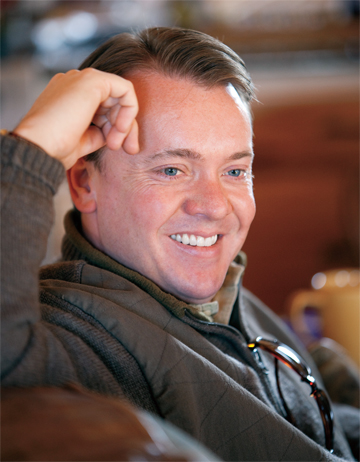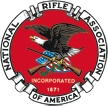| POLITICAL REPORT |
CHRIS COX, NRA-ILA Executive Director |
|
|
When it came to support for the Second Amendment, President Ronald Reagan demonstrated the difference between mere words and resolute action. As such he was the polar opposite of politicians such as John Kerry. |
The passing of President Ronald Reagan cast a pall over the nation`s capital in June. Partisan bickering gave way to somber remembrance as political leaders--from our country and all over the world--gathered side-by-side with a steady flow of American citizens to pay their respects to a great American leader.
Reagan`s firm principles and unrelenting optimism about the future of our country marked a sea change in American politics. Dispensing with the national self-doubt and "malaise" of the Carter years, Reagan united Republicans and Democrats alike in the pursuit of common-sense policies that put a new face on the goals of the conservative movement.
 |
"[T]he Constitution does not say Government shall decree the right to keep and bear arms. The Constitution says `the right of the people to keep and bear arms shall not be infringed.`"--President Ronald Reagan |
I still see the Reagan legacy at work in the nation`s capital every day. Few and far between are the politicians willing to call themselves "liberal" today. John Kerry, for instance-- who reluctantly drags behind him a 20-year voting record more liberal than even Ted Kennedy--calls himself a "centrist." It was Bill Clinton who pioneered the still-ongoing effort to appeal to so called Reagan Democrats by embracing Reaganesque objectives such as welfare reform, and by draping candidates in manufactured coinages like "New Democrats."
Labels and parties have never been meaningful in the debate over Second Amendment issues, but the insincerity of these repackaging efforts has echoes in the debate over our freedoms. Clinton and Kerry both claim to be supporters of the Second Amendment, but the Reagan legacy clearly outlines the difference between true support and the postcard politics of the New Democrats. Clinton and Kerry have both donned hunting garb to project their false Second Amendment credentials, but Ronald Reagan knew the difference between words and action.
In fact, President Reagan, the owner of an AR-15, was a strong and consistent supporter of the Second Amendment and the NRA. He was a long time member, joining NRA in December of 1972 and upgrading to Life Member in August of 1979. He actively courted the NRA`s endorsement in both of his presidential campaigns, and was the first presidential candidate in history to receive that endorsement. He appeared on the cover of NRA magazines four times. In 1983 he was offered, and accepted, an NRA Honorary Life Membership, the highest honor bestowed by the NRA.
He was the first, and to date, only, sitting president to speak at our Annual Meetings, and his remarks clearly illustrated his core support of the Second Amendment. Reagan told the cheering crowd that: "The NRA believes America"s laws were made to be obeyed and that our constitutional liberties are just as important today as 200 years ago. And by the way, the Constitution does not say Government shall decree the right to keep and bear arms. The Constitution says `the right of the people to keep and bear arms shall not be infringed.`"
Reagan felt at home before the assembled membership, saying "I`ve always felt a special bond with members of your group. You live by Lincoln`s words, `Important principles may and must be inflexible.` Your philosophy puts trust in people. . . . Good organizations don`t just happen. They take root in a body of shared beliefs. They flow from strong leadership, with vision, initiative and determination to reach great goals."
President Reagan shared our pursuit of great goals through the 1980s--the rollback of the most onerous provisions of the Gun Control Act of 1968. And in 1986, President Reagan proudly signed the landmark Firearms Owners` Protection Act (FOPA) into law.
Sadly, some gun-ban advocates have callously exploited Reagan`s passing to misrepresent his positions, staging scripted interviews with the most biased of national media outlets to insist that he supported their anti-gun agenda and even claiming that he never held an NRA membership. I can feel only sadness at these crass and desperate lies. They merit no response; the historical record is clear and amply documented.
I will share with you, however, one additional anecdote that sheds light on Reagan`s core belief in our rights and freedoms. Little noted until his ascendance to the Presidency, the story takes place on an autumn evening in 1933, in Des Moines, Iowa.
Melba King was a 22-year old nursing student, and was walking home one evening when she was approached by a mugger with a gun who demanded her money. Reagan, then working as a local radio sportscaster, espied the confrontation from his second-story rented room. Leaning out the window with a .45 caliber revolver, Reagan sternly directed the mugger to "leave her alone or I`ll shoot you right between the shoulders." The mugger ran off, and Reagan calmed the woman, escorting her home safely.
Melba King did not encounter Reagan again until 1984, at an Iowa political rally. Iowa governor Terry Branstad knew of the incident and invited King to the event to surprise Reagan. After King and Reagan hugged on stage, Reagan laughed and told the crowd, "This is the first time I`ve had a chance to tell you the gun was empty. I didn`t have any cartridges. If he hadn`t run when I told him to, I was going to have to throw it at him."
May we all aspire to the same degree of courage, both in our convictions and in the face of adversity, and may Ronald Wilson Reagan rest in peace.















 More Like This From Around The NRA
More Like This From Around The NRA



